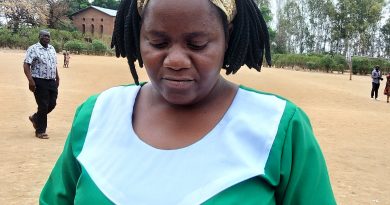‘Dziko Lathu Project’ fully charged to save the environment
By Joseph Kayira
From the Earth Summit in Rio de Janeiro in Brazil in June 1992 to the creation of the United Nations Sustainable Development Goals (SDGs) – which are a series of call to actions to help progress the global community towards a more positive future – nations agree that caring for the environment, which is our common home, can reduce land degradation and the loss of biodiversity. A secondary school in southern Malawi is making a difference towards saving the environment through an initiative called ‘Dziko Lathu Project’.
More than ever before, communities must prepare for climate-related changes and disasters which negatively impact on economic growth and food security, among many concerns. That is why two volunteers from Italy – Federico Chiavazza and Stefania Mura – have embarked on an exciting project with students of Andiamo Secondary School, under Andiamo Youth Cooperative Trust (AYCT) in Balaka to reforest part of the school land. They also want to clean surroundings as one way of removing the eye sore of thin plastics that are almost everywhere – at market places, in schools, on roads and private and public spaces.
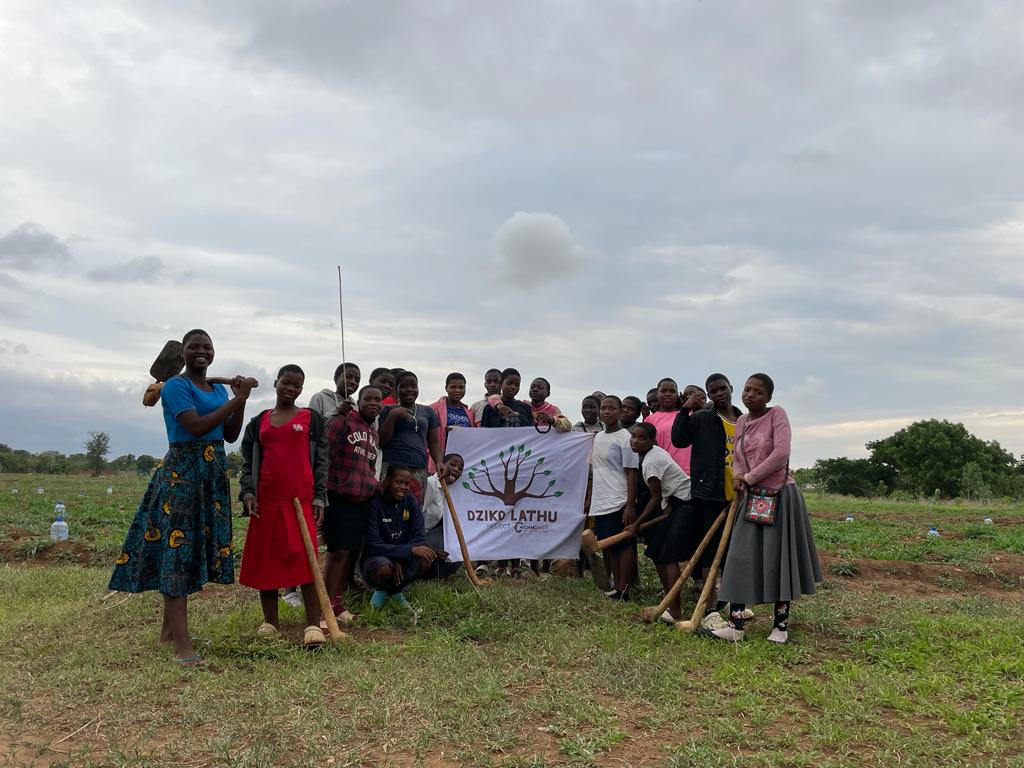
Students from Andiamo Secondary School are proud of the Dziko Lathu Project (Photo Credit: Federico Chiavazza
Through ‘Dziko Lathu Project’ students from the school are already on the ground on a reafforestation drive. Their dream is to plant over 100 trees this rainy season and make sure that they survive. During the tree planting season, government and stakeholders plant millions of trees; few survive due to lack of care. Andiamo Secondary School is taking a different approach; every tree planted must be cared for, and it must survive. And that is how a forest is being created at the school. In a few years-time this forest will act as a model to others that once cared for, trees survive – and the benefits are numerous.
Federico says: “We would like to engage the students of the secondary school to reforest part of the land of AYCT. We will learn together and in practice take care of our environment and economic-social system. Our aim is to create an educational forest that can become a place of recreation and teaching.”
He explains that another important core of the project is to raise awareness on the importance of restoring the environment in an era when degradation is taking its toll on forests and soil and its impact has been devastating.
“Andiamo is the first school we are working with on the project and the results are very encouraging. The students realise the importance of conservation. They are excited that they are taking care of their own surroundings. The beauty of it is that they are doing it for their own school,” Federico says.
As forest cover gets depleted due to pressure for the need of fuelwood, planks and other products from forests, schools, colleges and communities need to decisively deal with “challenges emerging across the planet from climate change and the loss of species to desertification and land degradation.” Thus, a project like Dziko Lathu could be significant to “conservation actions and policies that safeguard and sustainably manage forests and endangered species.”
Stefania says the project goes beyond tree planting as it also have a component that deals with plastic waste management. In collaboration with the district council, the school has already organized a clean-up campaign around Balaka town.
“The awareness we are so much talking about also talks about plastic waste management. The students collect plastics for recycling. Plastics are dangerous to the environment as they can stay in the soil for hundreds of years without decomposing. We need to get rid of plastics as one way of making sure that the environment remains safe and sustainable for use,” she says.
She says the idea of the whole project is to make sure that more youths, especially those in secondary schools are taking part in caring for the environment.
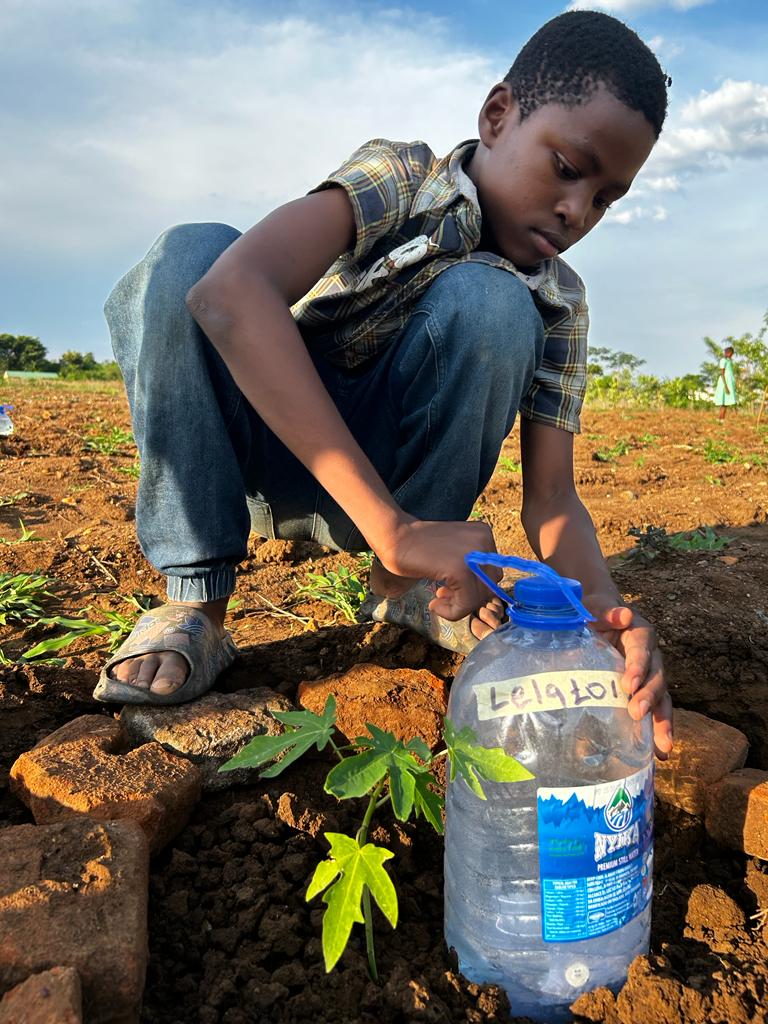
This is how we do it: a papaya tree takes root (Photo Credit: Federico Chiavazza)
“We want everyone, especially the youth to be in the forefront of issues that stem from climate change, the environment and unsustainable plastic waste management. The youth can play a significant role in supporting initiatives that can help in caring for the environment. At Andiamo things are already happening and heading in the right direction. Other schools can take a leaf from what the students there are doing,” Stefania says.
Students happy to take part
A student at Andiamo Secondary School, Angela Mtunthama, says she is happy to be part of students who have vowed to plant different trees to make a difference in the lives of those learning and living around the school.
“Issues pertaining to the environment and climate change are real. We are happy to be part of students who are implementing climate action at our school. We are dealing with plastic pollution, recycling plastic papers and collecting waste, such as nsima leftovers, that can be used as manure for trees in our forest,” she says.
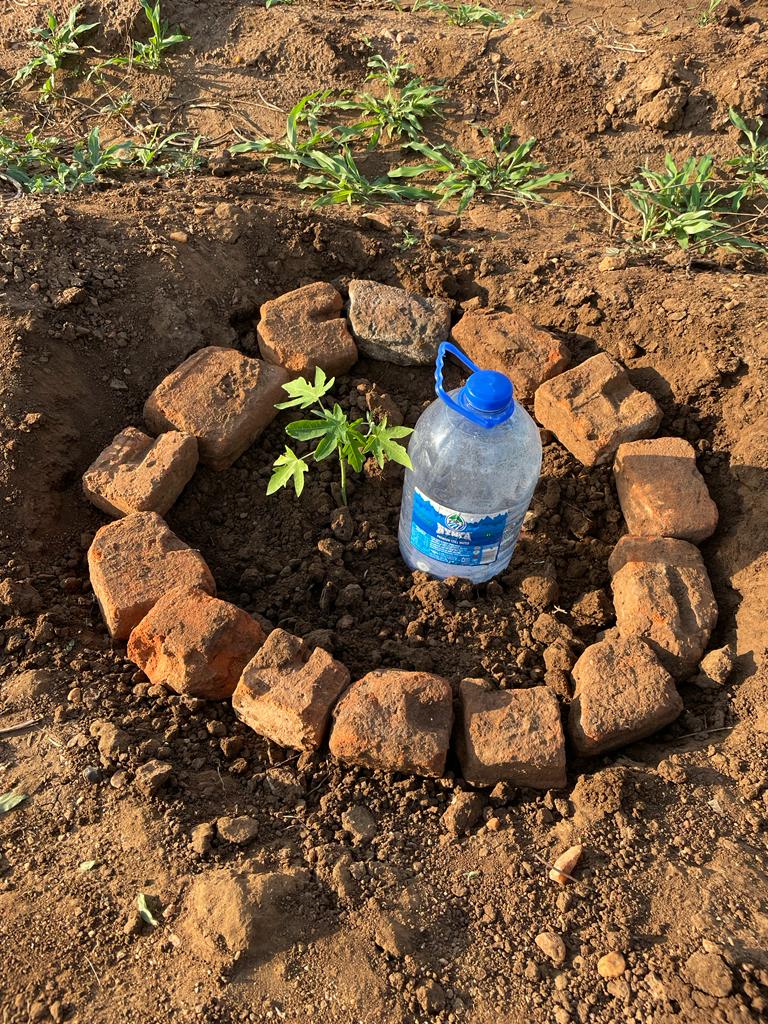
With water in the bottle trees will not wither away (Photo Credit: Federico Chiavazza)
She is encouraging fellow students to take matters of climate change seriously as they have a direct bearing on their daily lives and needs. Angela says students must commit to conservation actions and policies that safeguard and sustainably manage forests.
Fraser Mwatiha, another student at Andiamo says planting trees is not just about dealing with present day problems communities face. “We are doing it for future generations too.”
“I would like to ask communities not to cut down trees wantonly. Instead, they should use forests sustainably. That means planting more trees and taking care of those that have been there for years. We want to make sure that new shoots are protected too. It is possible to protect our forests and benefit from them if we first understand the dangers of environmental and soil degradation,” he says.
Fraser wants surrounding communities, take care of the remaining forests as one way of complementing government’s policy on the environment.
Commenting on the issue, Olive Chitatu, another student, says it is possible to protect natural resources such as forests and students from Andiamo Secondary School are already proving it that such an undertaking is a possibility and worthwhile.
“We usually have little or receive slightly above normal rains in Balaka; some places are too dry. So, when you are planting trees, you have to consider the weather too. But at Andiamo we are using bottles to water the seedlings and its working.
“You dig a pit and put beside the seedling an empty bottle which you fill with water. The small hole that you drill into the bottle releases the water slowly so much that even when it is sunny the tree will continue to be watered and won’t wither away,” Olive says.
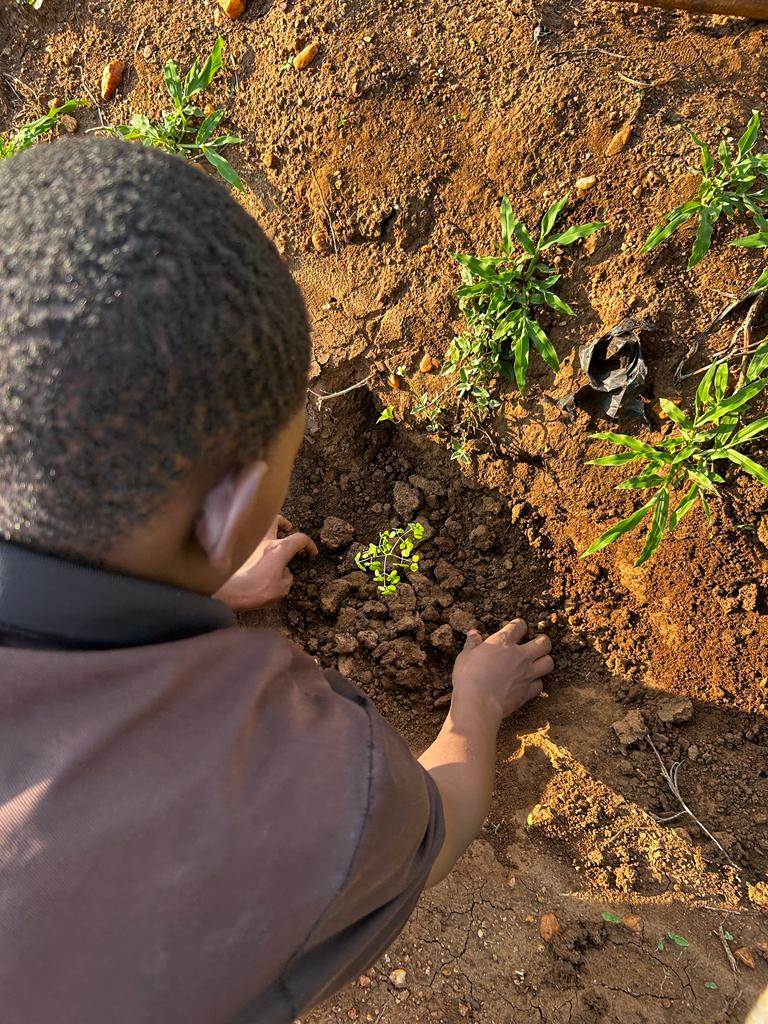
Students want to create a forest within the school (Photo Credit: Federico Chiavazza)
So far, the students have planted moringa trees, coffee, jacaranda trees and fruit trees such as papaya. In view of the importance the United Nations SDGs on ending poverty, tackling climate change, life on land and other goals – these students, teachers and volunteers are already on track to add a voice and seek solutions to environmental concerns. The challenges that environmental concerns pose threaten opportunities for millions in this country to thrive and survive.
Most Malawian households, including schools and colleges, rely on firewood or charcoal as their primary source of cooking and heating fuel. Analysts say firewood and charcoal will continue to form a significant part of energy for some years to come. The high demand for charcoal and firewood is fueling deforestation and forest degradation. This is further undermining agricultural productivity and food security, water security and hydroelectric generation capacity – leaving the country more vulnerable to climate shocks – hence the need to increase efforts for afforestation interventions at all levels of society.


